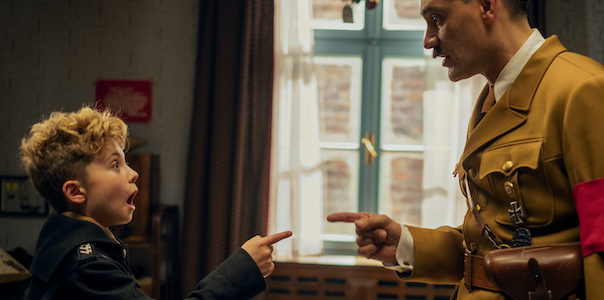
ReelBob: ‘Jojo Rabbit’ ★★★★
By Bob Bloom
“Jojo Rabbit” is an antiwar satire as seen from the perspective of a 10-year-old boy.
Jojo is a Nazi fanatic who wishes he was old enough to carry a rifle and fight for his Fuhrer. His room is decorated with posters of swastikas and portraits of Adolf Hitler.
Jojo is so dedicated to his leader that Hitler is his imaginary friend.
All this may sound sick, but Roman Griffin Davis’ innocence and naivete as Jojo make it work.
Jojo is devoted to his mother, Rosie (Scarlett Johansson), who is pragmatic and outspoken. She continually reminds her son that Germany is losing the war, despite Hitler’s propaganda.
Two events turn Jojo’s world upside down: The first, at a Hitler Youth weekend summer camp, where Jojo is injured an accident with a grenade that leaves his face scarred making him limp. The second, is the discovery of Elsa — Thomasin McKenzie, who was outstanding in last year’s “Leave No Trace” — a Jewish teenager that his mother has hidden in their attic.
The best parts of “Jojo Rabbit” are the exchanges between the boy and his imaginary Adolf, a wonderfully wild performance by the movie’s director-screenwriter Taika Waititi.
He plays this historical monster as a little German boy of that era would imagine him — cool, a bit crazy, wild and funny.
The performance rivals Charlie Chaplin’s Adenoid Hynkel from “The Great Dictator” or, on a more lowbrow note, one of Moe Howard’s impersonations from a Three Stooges short.
Elsa is our surrogate. She is constantly questioning and challenging Jojo’s devout nationalism, actually forcing him to think about the outlandish rubbish spewed by the Nazi regime to corrupt every German’s mind.
“Jojo Rabbit” stands out because of the choices Waititi employs to convey his story. For example, he uses contemporary music instead of the cliched German militaristic compositions of the era.
And he sets up Jojo’s imaginary Hitler perfectly by using newsreel footage of screaming, adoring crowds worshipping their Fuhrer, overlaid with The Beatles’ “I Want to Hold Your Hand” — sung in German, of course.
Waititi also is not afraid to change course. After 90-plus minutes of childhood goofiness, the movie takes a dark and tragic turn that forces Jojo to confront the reality of war and his devotion to his idol.
Elsa has told Jojo that he is really not a Nazi, but simply a little boy in a silly uniform playing a game.
And as the Allies near his hometown, Jojo begins to realize the truth of her words.
Laughing at the cruelty and fanaticism of Hitler’s horrific regime has a long history in Hollywood — from the aforementioned “Great Dictator” and Three Stooges shorts to Ernst Lubitsch’s 1942 “To Be or Not to Be” (as well as Mel Brooks’ 1983 remake) and Brooks’ 1967 “The Producers,” which featured the now-classic “Springtime for Hitler” musical number.
Confronting the unthinkable with mockery cannot erase — or even lessen — the memories of that time, but it helps diminish the monsters whose sick minds led to the death of millions.
Watiti’s “Jojo Rabbit” puts a spotlight directly into the eyes of evil, as well as ridiculing hateful ideologies and dialogues contaminating today’s world.
It also offers a message of hope, showing that love can overcome darkness no matter how much time it takes.
I am a founding member of the Indiana Film Journalists Association. My reviews appear at ReelBob (reelbob.com) and Rottentomatoes (www.rottentomatoes.com). I also review Blu-rays and DVDs. I can be reached by email at bobbloomjc@gmail.com or on Twitter @ReelBobBloom. Links to my reviews can be found on Facebook, Twitter and LinkedIn.
JOJO RABBIT
4 stars out of 4
(PG-13), violence, language, disturbing images, mature themes